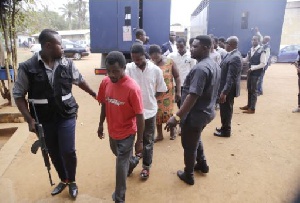The 14 suspects who are being tried at an Accra high court accused of murdering Major Maxwell Mahama at Denkyira Obuase (now New Obuase) in the Central Region in May last year, have pleaded not guilty to all the charges proffered against them.
The suspects (all males) are facing three counts of abetment to murder, conspiracy to commit crime to wit, murder, and murder contrary to Section 46 of Act 29 of 1960.
The charges were read to the accused persons at the court, presided over by Justice Mariama Owusu, an Appeals Court judge sitting as an additional judge, and they all pleaded not guilty.
William Baah, assemblyman for the area at the time of the incident, has been charged with abetment of crime to wit, murder, to which he pleaded guilty.
Thirteen of the suspects – Bernard Asamoah, Kofi Nyame, Akwesi Baah, Kwame Tuffuor, Joseph Appiah Kubi, Michael Anin, Bismark Donkor, John Boadi, Akwesi Asante, Charles Kwenin, Emmanuel Baidoo, Bismark Aboagye and Kwadjo Animah – are facing charges of conspiracy to murder; but they all pleaded not guilty.
Eight of them are facing an additional charge of murder. They are Bernard Asamoah, Kofi Nyame, Akwesi Baah, Kwame Tuffuor, Joseph Appiah Kubi, Michael Anin, Akwesi Asante and Charles Kwenin; they also pleaded not guilty.
Lawyers
At the last adjourned date, some of the suspects were struggling to get legal representation as they could not afford the services of one.
The presiding judge, therefore, urged the two defence lawyers as well as state prosecutors to make sure that the other suspects get lawyers as they could not be left to their fate, considering the magnitude of the charges they are facing.
At yesterday’s sitting, it turned out that all the suspects, except two, could not get lawyers and the court assigned one for them.
The defence lawyers are George Bernard Shaw, representing William Baah, Bernard Asamoah, Akwesi Baah, Bismark Donkor, Akwesi Asante and Emmanuel Baidoo.
Lawyer Augustine Gyamfi is representing Michael Anin and Charles Kwenin whiles Augustine Obuor is representing Kwame Tufuor and Joseph Appiah Kubi.
Another private legal practitioner, Seidu Nasigri, is representing Kofi Nyame and John Boadi while Godwing Gyamfi – who was appointed by the court – is representing Bismark Aboagye and Kwadjo Animah.
Jury
It appears the court is still facing challenges in empanelling a jury for the trial.
At the last sitting, Justice Mariama Owusu made it clear that some of the jurors are 58 years old and are only a year and some months away from their retiring ages and would therefore, not risk starting the trial all over again.
Although the judge requested for between 13 and 15 jurors from which the seven could be picked, only seven were available.
The court was told that the others were hearing other cases in different courts.
In order not to overburden the jurors, Justice Owusu dropped those with more than two cases and picked four out of the seven who have just one or two cases they are handling.
The case has been adjourned to April 12, 2018.
The 14 suspects were committed by an Accra Central District Court, which found that there was enough substantial evidence against them to stand trial for the offences proffered against them.
They were among some 22 persons arraigned before the court, charged with murder and conspiracy to commit murder.
Major Maxwell Mahama was allegedly killed by the 14 suspects and others who are still at large, at former Denkyira Obuase where he was on detachment duties.
Major (then Captain) Mahama, was on a 20-kilometre walk when he was reportedly mistaken for a thief by some women from whom he stopped to buy snails.
The women, who thought he was an armed robber after spotting his official pistol, called the assemblyman in the area to raise an alarm.
The assemblyman then allegedly organised people in the town to lynch the soldier and later burnt parts of his body.
General News of Thursday, 22 March 2018
Source: dailyguideafrica.com













